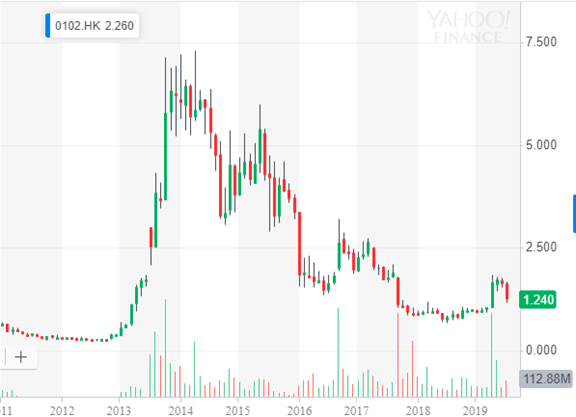If we look around the world at the state of regional gaming industries, there are almost no true “investments” anymore. Each region has its own tripwires that could destabilize business at any time. It becomes a game of timing and second guessing. You can’t just put money down in most places long term and expect everything will be fine. Every position requires constant monitoring. The United States for example is likely to see a rally in the next few months but that has to be timed.
 Across the pond, while I personally believe the U.K. will survive a no deal Brexit and after a brief hard dip U.K. gaming will recover, I could be wrong. It is possible we could see a Las Vegas style post 2008 fall without a quick recovery. Any money you put in the U.K. needs constant monitoring as well. Same with companies within the Eurozone and Scandinavia. There are better and worse picks in these places, but like latent syphilis the situation is continually worsening there without obvious symptoms. Negative interest rates have infected nearly the whole continent. Even Greece is selling government paper at 2%. Try to figure that one out. In the words of Mugatu, I feel like I’m taking crazy pills. Would you buy a 10Y Greek bond for 2%? Would anybody who’s not a central bank?
Across the pond, while I personally believe the U.K. will survive a no deal Brexit and after a brief hard dip U.K. gaming will recover, I could be wrong. It is possible we could see a Las Vegas style post 2008 fall without a quick recovery. Any money you put in the U.K. needs constant monitoring as well. Same with companies within the Eurozone and Scandinavia. There are better and worse picks in these places, but like latent syphilis the situation is continually worsening there without obvious symptoms. Negative interest rates have infected nearly the whole continent. Even Greece is selling government paper at 2%. Try to figure that one out. In the words of Mugatu, I feel like I’m taking crazy pills. Would you buy a 10Y Greek bond for 2%? Would anybody who’s not a central bank?
Turn to Macau, same thing. Putting money into Macau is playing a game of chicken with the Chinese economy and Beijing economic policy. With the riots coming out of Hong Kong there is no telling how Xi Jinping could respond now or where the fallout goes. Macau stocks go up and down in crazy sine waves, the consequence of running an economy through constant fiscal and monetary stimulus. If you sink 10% of your money into Macau stocks now and leave it for 10 years, where will you be by then? Who the heck knows?
Just take a look at Wynn, for example. If you bought shares in January 2007 you would have been up and down in four cycles. As recently as last December you would have been down. Now you’d have been up. But a month from now you could be down again. This isn’t really “investing”. It’s timing and second guessing and luck. I try to time these things here. Sometimes I’m right. Sometimes I’m wrong. But it doesn’t really feel like investing.
Or take the Philippines. I happened to be right on my view of the interplay between Rodrigo Duterte and the Philippines gaming industry, but that wasn’t investing either. It was a political forecast. News out last week that the former archenemy of gambling has now done a complete 180o and now wants more gambling was something I predicted one year ago.
But I could have been wrong.
So is there anywhere in the world where the money you put in can really be used for long term bona fide investment purposes, like to really build something that’s not there yet in a concrete sense, within a fiscal and monetary environment that actually looks stable long term? A region that actually needs your money to expand?
Yeah, there is one. It’s in the Primorye region of Russia. If I had to pick one stock that I had to hold for, say 15 years and could not sell no matter what and I wanted to sleep well at night, I would pick Summit Ascent Holdings.
First we have to understand why Russia generally is among the safest places in the world to invest long term. First of all, interest rates there are pretty normal by historical standards at 7.33%. From about 1970 to 1995 this was around the average level of rates in the U.S. One could argue that this is good because it gives Russia’s central bank “ample room to stimulate”, but Russia is beyond such Keynesian prime-pumping stupidity.
Russia is not even playing the stimulus game at all. It’s pulled out of that completely. Look at Russian monetary policy since 2010 and you may see otherwise because the ruble supply has tripled, up by a factor of about 3.11x. But the amount of gold backing the ruble supply has increased by even more than that. China’s gold reserves since 2010 are up also, about 75%, but not nearly by as much as the yuan supply. In a currency crisis, the ruble will be rock solid. The yuan, the dollar, the euro, the pound, the yen, the kroner, the Philippine peso, will not. (Unless China actually has more gold than it admits, but again this is guessing, not investing.) The purchasing power of the Ruble will skyrocket, Russians will become rich at the expense of the West, and Primorye will prosper even if gambling traffic from China falls.
The political situation in Russia, like anywhere, is not wonderful, but Vladimir Putin looks to be mostly interested in himself and his own narrow interests rather than clouded with some grandiose vision as to how to make his country into Eden. Russia tried that for 70 long years. Didn’t work so well.
It’s not like there’s all that much to choose from for Primorye investors yet, but Summit Ascent is moving forward, already net positive, low debt, and with a very attractive technical chart.

It’s been net positive since 2016, back when the Ruble was collapsing on oil bottoming out at $26, showing that even in times of heavy stress it can still make a profit. In the near term, profits will be dependent on Chinese VIP traffic so the stock will be tied to Macau somewhat. There will be ups and downs as always, but over the long haul investors could see real gains of 1000% or more. Since the casino will earn its revenue in Rubles, there is no need to worry about devaluation.
Summit Ascent just announced an equity raise, which isn’t unusual for a developing region. Short term downside is possible with long term support at $0.75 a share, but we’ve seen how this stock can respond when there’s significant interest, like what happened back in 2013. My belief is that when the brown stuff hits the fan among all the big spending and indebted governments in the West and China, we’re going to see a sudden surge of interest in investment in Russia, and Primorye is going to be a favorite among money managers, especially those focused on emerging market stocks. If you plan to hold Summit Ascent for the long term, the downside is limited and the upside is enormous. It’s not riskless, but at least it’s an actual investment of capital rather than a pure guessing game of monetary policy and timing.